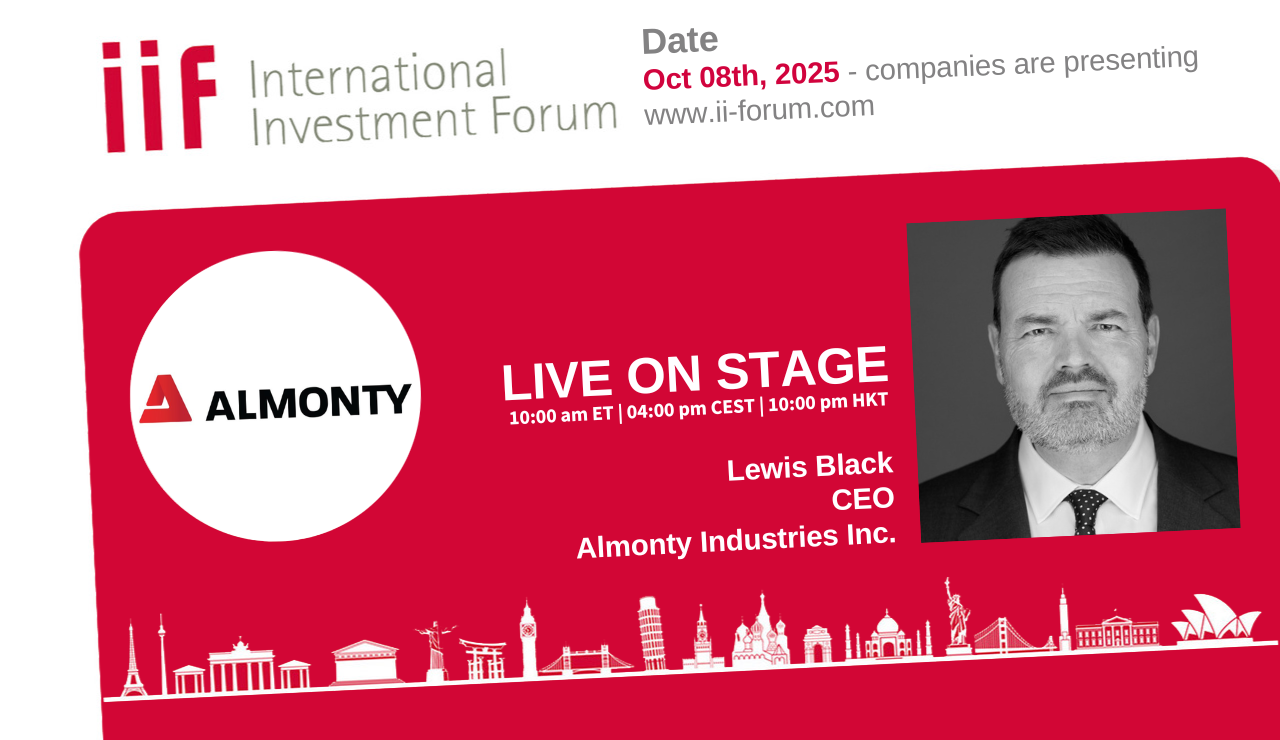October 8th, 2025 | 07:00 CEST
US industrial policy at a turning point – how shareholders stand to benefit: MP Materials, Intel, Almonty
The administration of US President Donald Trump has shaken things up considerably in its first few months in office. Some changes unsettle observers, while others could serve as a blueprint for other economic regions such as the EU. A good example of the latter scenario is the US's direct investments in companies that are essential to critical supply chains. Examples include rare earths producer MP Materials, chip developer Intel, and lithium company Lithium Americas – the US now holds shares in all three companies. We analyze the strategy behind this policy and what it could mean for other suppliers of critical metals, such as tungsten producer Almonty Industries.
time to read: 4 minutes
|
Author:
Nico Popp
ISIN:
MP MATERIALS CORP | US5533681012 , INTEL CORP. DL-_001 | US4581401001 , ALMONTY INDUSTRIES INC. | CA0203987072
Table of contents:

"[...] While tungsten has always played an important role in the chip industry, it is now being added to batteries for e-cars. [...]" Lewis Black, CEO, Almonty Industries
Author
Nico Popp
At home in Southern Germany, the passionate stock exchange expert has been accompanying the capital markets for about twenty years. With a soft spot for smaller companies, he is constantly on the lookout for exciting investment stories.
Tag cloud
Shares cloud
MP Materials: 100% performance after US investment
When the US acquired shares in MP Materials last summer, it pushed up the share price significantly – within a few hours, the price of the rare earth specialist doubled. The agreement between the US and MP Materials provides for the issuance of preferred shares and options that are convertible into common shares of the Company and secures the US a 15% stake in the Company. In addition, the US is offering a price guarantee for neodymium-praseodymium oxide that is more than 100% above the current market price, as well as a purchase guarantee for 100% of production for a period of ten years. Unlike MP Materials, where the US negotiated directly through an investment, existing subsidies and loans were converted into equity at Intel and Lithium Americas. In the case of Intel, the new shares are non-voting.
How to assess the US's new industrial policy
Many representatives of the international press are critical of this new form of state capitalism. The New York Times calls Donald Trump's administration an "activist investor" and cites a lawyer noting that companies which previously received subsidies are now concerned. Scott Lincicome of the libertarian Cato Institute in Washington described the Intel agreement as "a dangerous turn in American industrial policy," arguing that decades of market-oriented principles have been abandoned in favor of government ownership in private enterprises. The BBC takes a somewhat milder view, pointing out that while government stakes in private companies are rare in the US, they are not uncommon in other parts of the world, particularly Europe.
But what does the new US industrial policy really mean for companies and investors?
After decades of globalization, during which the current market price was the primary factor determining business relationships, security of supply has once again become the focus of attention for companies and governments alike. This is particularly true for critical raw materials for future technologies or defense products. The example of the unique element tungsten shows that the US currently has no domestic sources. The global supply still comes predominantly from China, Russia, or North Korea, countries that are geopolitical rivals of the US. With targeted investments, but also purchase guarantees for products, favorable regulatory conditions, and market-driven prices, the US is essentially intervening in the free economy, but at the same time creating long-term conditions to bring back capacities that are essential for the future of the US. This is giving rise to entirely new ecosystems around critical raw materials and industrial precursors for defense and high-tech, from which the US as a nation, but also companies and shareholders, can benefit.
Almonty: Partner to US industry with a perfect starting position
The details of the agreement between MP Materials and the US show that it is entirely possible for companies to negotiate on an equal footing with the new government investors – purchase guarantees for ten years and guaranteed purchase terms well above the current market level offer MP Materials the best conditions for further growth. Tungsten producer Almonty Industries, whose important strategic role for US security has already been confirmed by the US Congress in a letter, has also concluded similar purchase agreements in the past. Last May, Almonty signed a purchase agreement with the state-affiliated company Tungsten Parts of Wyoming (TPW) to supply 40 tons of tungsten oxide per month at a guaranteed minimum price of USD 330/ton with no price cap in the event of rising market prices. TPW's main customers are Lockheed Martin, Northrop Grumman, Boeing, Raytheon, and General Dynamics. The US defense industry is therefore already dependent on tungsten from Almonty.
Given this situation and the fact that Almonty will bring the largest tungsten mine outside China - Sangdong in South Korea - into production by year-end, while also planning to purchase another project in the US, there is much to be said for further deepening of business relations with US industry. Since Almonty has not received any US subsidies in the past, direct government participation, as seen with Intel or Lithium Americas, is unlikely. On the contrary, the tungsten specialist is likely to be in a good negotiating position. With its unique expertise and strategic tungsten projects, Almonty aligns perfectly with US government interests. The coming months will reveal what role Almonty, which is currently relocating its headquarters to the US, will play in the future.
Oppenheimer: Almonty undervalued compared to peer group – New price target
The current share price performance already reflects high market expectations for Almonty. As a recent analysis by investment bank Oppenheimer shows, Almonty's shares are still significantly undervalued compared to the shares of other companies in the critical raw materials sector. Oppenheimer sees Almonty's price-to-earnings ratio for 2027 at 17.4. MP Materials has a P/E ratio of just under 50, while uranium giant Cameco has a P/E ratio of 45. There are many indications that this valuation anomaly could disappear in the coming months – the start of production in Sangdong, the possible purchase of a mine in the US, and the resulting additional purchase agreements and cooperations could boost Almonty's share price. Analysts at DA Davidson also see good prospects for Almonty's stock and raised their price target on Tuesday from USD 7.00 to USD 11.
Today, Wednesday, 8 October 2025, at 4 p.m. CET, Almonty CEO Lewis Black will give a free presentation at the virtual 16th International Investment Forum. Register here.

Conflict of interest
Pursuant to §85 of the German Securities Trading Act (WpHG), we point out that Apaton Finance GmbH as well as partners, authors or employees of Apaton Finance GmbH (hereinafter referred to as "Relevant Persons") currently hold or hold shares or other financial instruments of the aforementioned companies and speculate on their price developments. In this respect, they intend to sell or acquire shares or other financial instruments of the companies (hereinafter each referred to as a "Transaction"). Transactions may thereby influence the respective price of the shares or other financial instruments of the Company.
In this respect, there is a concrete conflict of interest in the reporting on the companies.
In addition, Apaton Finance GmbH is active in the context of the preparation and publication of the reporting in paid contractual relationships.
For this reason, there is also a concrete conflict of interest.
The above information on existing conflicts of interest applies to all types and forms of publication used by Apaton Finance GmbH for publications on companies.
Risk notice
Apaton Finance GmbH offers editors, agencies and companies the opportunity to publish commentaries, interviews, summaries, news and the like on news.financial. These contents are exclusively for the information of the readers and do not represent any call to action or recommendations, neither explicitly nor implicitly they are to be understood as an assurance of possible price developments. The contents do not replace individual expert investment advice and do not constitute an offer to sell the discussed share(s) or other financial instruments, nor an invitation to buy or sell such.
The content is expressly not a financial analysis, but a journalistic or advertising text. Readers or users who make investment decisions or carry out transactions on the basis of the information provided here do so entirely at their own risk. No contractual relationship is established between Apaton Finance GmbH and its readers or the users of its offers, as our information only refers to the company and not to the investment decision of the reader or user.
The acquisition of financial instruments involves high risks, which can lead to the total loss of the invested capital. The information published by Apaton Finance GmbH and its authors is based on careful research. Nevertheless, no liability is assumed for financial losses or a content-related guarantee for the topicality, correctness, appropriateness and completeness of the content provided here. Please also note our Terms of use.




